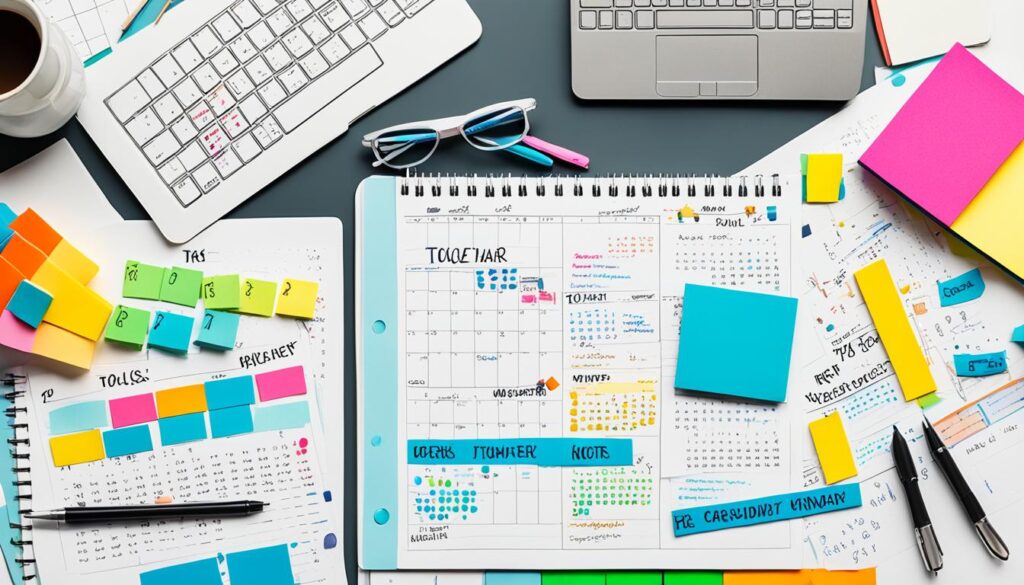Overcome Poor Time Management – Transform Today!

“Time is what we want most, but what we use worst.” – William Penn
Poor time management is a common struggle that many people face, but it doesn’t have to hold you back. By implementing effective time management strategies, you can transform your productivity and take control of your schedule. In this article, we will explore valuable tips and techniques to help you overcome poor time management and make the most of your day.
Key Takeaways:
- Understand the importance of managing your time effectively
- Assess how you currently spend your time to identify areas for improvement
- Set priorities and create a plan using time management tools and techniques
- Improve organization and delegation to optimize your time management
- Develop strategies to overcome procrastination and manage time-wasters
The Importance of Time Management
Effective time management is crucial for personal and professional success. When you manage your time well, you can accomplish more in less time, reduce stress, and achieve a better work-life balance. By prioritizing your tasks, setting clear goals, and eliminating time-wasting activities, you can experience the benefits of improved time management.
Proper time management skills enable you to stay organized, focused, and productive, allowing you to make the most of each day. When you prioritize your tasks based on their importance and urgency, you ensure that you are allocating your time and energy efficiently. This helps you meet deadlines, complete projects, and achieve your desired outcomes.
One of the key benefits of effective time management is increased productivity. By managing your time well, you optimize your workflow, enabling you to work smarter, not harder. This means that you can accomplish tasks in a shorter amount of time without sacrificing quality. As a result, you have more time available to invest in other important areas of your life, such as personal development, relationships, or leisure activities.
Aside from improving productivity, proper time management also contributes to stress management. When you have poor time management skills, you tend to feel overwhelmed and constantly racing against the clock. This can lead to increased stress levels and reduced overall well-being. On the other hand, when you effectively manage your time, you create a sense of control and calm. You can approach your tasks and responsibilities with confidence, knowing that you have allocated enough time to complete them.
Furthermore, effective time management allows for a better work-life balance. When you have poor time management, work tends to spill over into your personal life, causing imbalance and strain. By implementing time management techniques and creating boundaries, you can separate your work and personal life, ensuring that neither aspect suffers. This helps you foster harmonious relationships, maintain good health, and enjoy a fulfilling personal life.
The Benefits of Time Management:
- Increased productivity
- Reduced stress
- Better work-life balance
- Achievement of goals
- Improved focus and concentration
- Enhanced decision-making ability
- Opportunities for personal growth and development
Investing in developing your time management skills is a valuable choice that yields numerous benefits. It not only allows you to accomplish more in less time but also provides you with the opportunity to lead a more fulfilling and balanced life.
Implementing effective time management techniques can transform your life, making you more productive, focused, and satisfied. It gives you the power to control your time, rather than being controlled by it. By prioritizing tasks, setting goals, and eliminating time-wasting activities, you unlock your potential for success.
Assessing Your Time Usage
Before you can improve your time management, it’s important to understand how you currently spend your time. By keeping a time log for a week or two, recording your activities in 15-minute intervals, you can gain valuable insights into your time usage patterns. This exercise will allow you to identify time-consuming tasks and patterns that may be affecting your productivity.
Here is a suggested format for your time log:
| Time | Activity |
|---|---|
| 9:00 AM – 9:15 AM | Checking emails |
| 9:15 AM – 9:30 AM | Responding to urgent work requests |
| 9:30 AM – 9:45 AM | Attending a team meeting |
| 9:45 AM – 10:00 AM | Completing administrative tasks |
| … | … |
Once you have collected enough data, take some time to review and analyze the results. Look for patterns, such as recurring time-consuming tasks or activities that are not aligned with your priorities. By identifying these patterns, you can make informed decisions on where to make adjustments and improvements in your time management.
![]()
Visualizing your time usage can be a powerful tool in understanding how you allocate your time. Consider creating a graph or chart to help you visually analyze your time log data and identify trends.
Remember, the goal of assessing your time usage is to gain insights and make necessary changes to improve your productivity. With this knowledge, you can make conscious decisions on how to allocate your time more effectively, ensuring that you are investing time in tasks and activities that align with your goals and priorities.
Setting Priorities and Creating a Plan
Setting priorities is essential for effective time management. By prioritizing your tasks, you can ensure that you focus on what matters most and make progress towards your goals. To help you with this process, there are two powerful tools you can utilize: the time management matrix and a to-do list.
Time Management Matrix
The time management matrix, popularized by Stephen Covey, is a simple yet effective tool for categorizing tasks based on their urgency and importance. It helps you determine which tasks require immediate attention and which tasks can be delegated or eliminated. The matrix is divided into four quadrants:
| Quadrant | Urgency | Importance |
|---|---|---|
| Quadrant 1: Urgent and Important | Prioritize | Deal with these tasks immediately, as they have a significant impact on your goals and deadlines. |
| Quadrant 2: Not Urgent but Important | Plan | Focus on these tasks, as they contribute to your long-term goals and personal growth. |
| Quadrant 3: Urgent but Not Important | Delegate | Consider delegating or outsourcing these tasks to free up valuable time for more important responsibilities. |
| Quadrant 4: Not Urgent and Not Important | Eliminate | Avoid or minimize these tasks, as they are time-wasters that do not contribute to your goals or well-being. |
By categorizing your tasks in this way, you can clearly see where to prioritize your time and energy.
To-Do List
Creating a to-do list is another valuable practice for setting priorities. List all the tasks you need to accomplish and rank them in order of importance. A well-structured to-do list ensures that you focus on the most critical tasks first and maintain momentum throughout the day.
Here’s an example of how a to-do list might look:
- Complete project report for client A
- Prepare presentation for team meeting
- Respond to urgent emails
- Follow up with potential leads
- Attend networking event in the evening
By reviewing your to-do list regularly and adjusting priorities as needed, you can stay on track and accomplish your goals more effectively.
Planning Tools
To support your prioritization and planning efforts, there are various tools available:
- Calendars: Use a physical or digital calendar to schedule appointments, deadlines, and important events. This helps you visualize your time commitments and avoid overloading your schedule.
- Planners: An organized planner provides a structured framework for managing your tasks, deadlines, and goals. It allows you to plan ahead and allocate time for each priority.
- Time Management Apps: There are numerous apps available that offer features such as task tracking, reminders, and time blocking. Find one that aligns with your needs and preferences.
Choose the planning tools that work best for you and integrate them into your daily routine. Consistent use of these tools will enhance your time management capabilities and ensure you stay focused and productive.

Now that you understand the importance of setting priorities and have the necessary tools at your disposal, it’s time to take action and optimize your time management.
Organization and Delegation
In order to optimize your time management, it is essential to establish organization and embrace the power of delegation. By decluttering your physical and digital spaces, you create an environment that promotes focus and efficiency.
Start by decluttering your physical workspace. Remove unnecessary items from your desk, keeping only the essentials within reach. Create designated spaces for supplies, documents, and tools, making it easier to find what you need when you need it. Remember, a clean and organized workspace is a breeding ground for productivity.
Similarly, digital clutter can also hinder your ability to manage your time effectively. Take the time to organize your computer files, deleting irrelevant documents and creating folders to store essential files in a logical manner. Implement an email organization system that allows you to process emails efficiently, ensuring that important messages are not overlooked amidst the clutter.
Delegation is another crucial aspect of effective time management. Recognize that you cannot do everything on your own. Identify tasks that can be delegated to others, whether it’s a colleague, team member, or virtual assistant. Delegating tasks not only frees up valuable time but also allows you to focus on more important responsibilities that require your attention.
Remember, organization and delegation go hand in hand. By organizing your physical and digital spaces and learning to delegate tasks effectively, you optimize your time management and create a foundation for success.

Benefits of Organization and Delegation
- Improved Efficiency: Clear and organized spaces promote productivity and streamline workflow.
- Reduced Stress: A clutter-free environment and shared workload alleviate stress and allow for better focus.
- Enhanced Decision Making: With an organized system in place, you can make decisions more efficiently and effectively.
- Increased Productivity: Delegating tasks to others allows you to focus on high-priority responsibilities, resulting in increased productivity.
- Time Freedom: By efficiently managing your tasks and delegating where appropriate, you gain valuable time to invest in activities that matter most to you.
Overcoming Procrastination and Managing Time-Wasters
Procrastination and time-wasting activities can derail your efforts to effectively manage your time. But fear not, with the right strategies, you can conquer these productivity killers and reclaim your valuable time. By implementing proven techniques, you’ll be able to stay focused, increase your productivity, and achieve your goals without falling victim to procrastination and distractions.
Stop Procrastination in Its Tracks:
- Adopt the “eating the big frog first” approach, tackling the most challenging tasks early in the day.
- Break down large tasks into smaller, more manageable segments, making them feel less overwhelming.
- Create a schedule or use time-tracking tools to set specific deadlines for each task, keeping yourself accountable and motivated.

- Turn off notifications on your phone or computer to minimize distractions and maintain your focus on the task at hand.
- Designate specific time blocks for checking emails or engaging with social media to prevent them from consuming your entire day.
- Identify the common sources of distractions in your environment and take proactive steps to eliminate or minimize them.
Avoid the Pitfall of Multitasking:
- Embrace single-tasking by working on one task at a time, allowing you to give your full attention and produce higher-quality work.
- Prioritize your tasks and allocate dedicated time slots to focus on each one, avoiding the temptation to juggle multiple tasks simultaneously.
- Organize your workspace and remove unnecessary clutter to minimize visual distractions and promote a more efficient workflow.
By implementing these strategies and techniques, you can overcome procrastination, manage time-wasting activities, and optimize your time management efforts. Take control of your time and unlock your true potential for productivity and success.
Conclusion
Congratulations! You now have the tools to overcome poor time management and transform your productivity. By implementing these effective time management strategies, you can take control of your schedule, reduce stress, and achieve your goals.
Start by assessing how you currently spend your time. Keep a time log, identify time-consuming tasks, and patterns. This will help you understand where your time is being invested and where adjustments can be made.
Next, set priorities and create a plan. Use a time management matrix to categorize tasks based on urgency and importance. Create a to-do list and utilize planning tools such as calendars or time management apps to stay organized and focused.
Additionally, focus on organization and delegation. Declutter your physical and digital spaces, implement an email organization system, and learn to delegate tasks to free up valuable time for more important responsibilities.
Lastly, overcome procrastination and manage time-wasters. Develop strategies to tackle procrastination and minimize distractions. By staying focused and avoiding multitasking, you can optimize your time and achieve greater productivity.
With effective time management, you can transform your life and accomplish more than you ever thought possible. So take control of your time today and unlock your potential for success!






